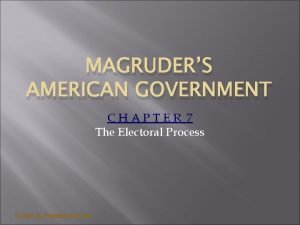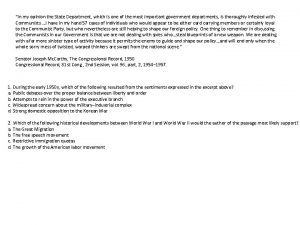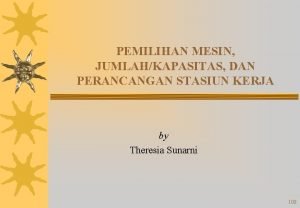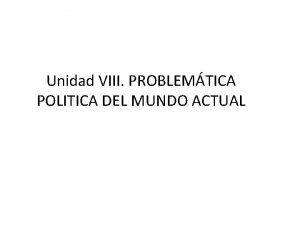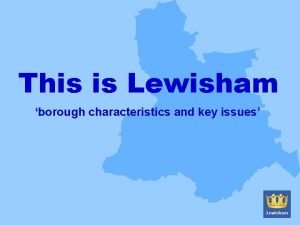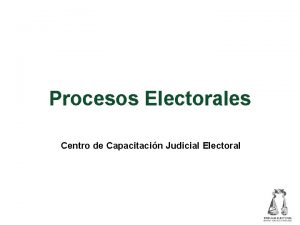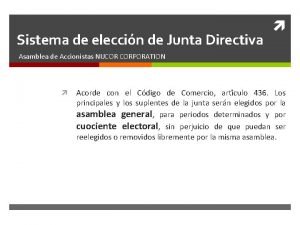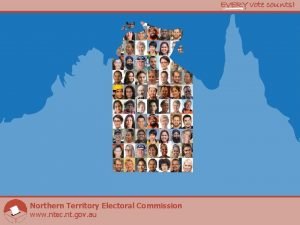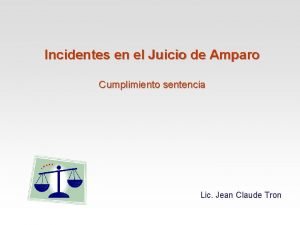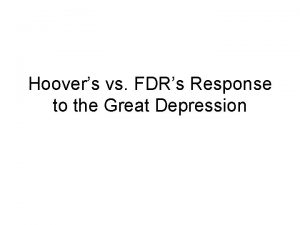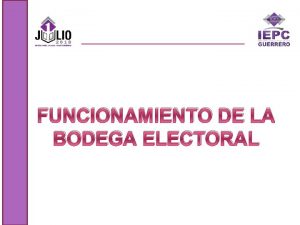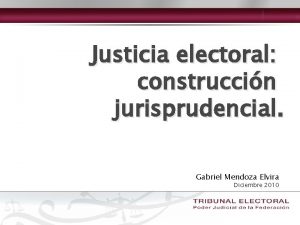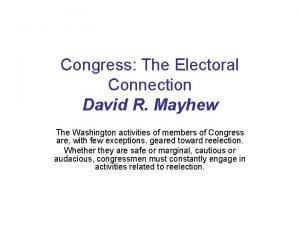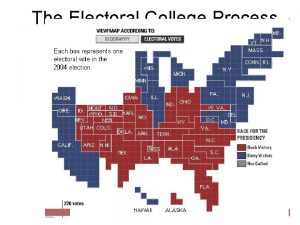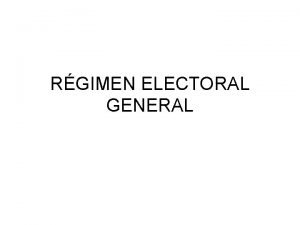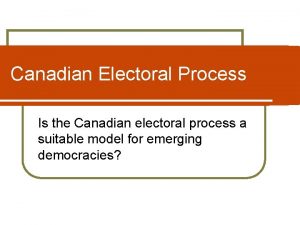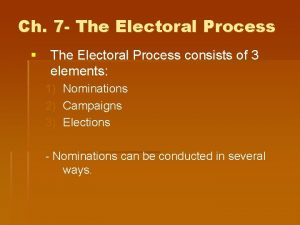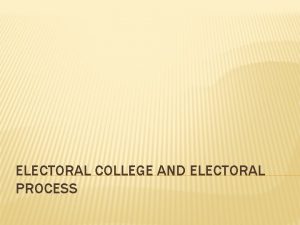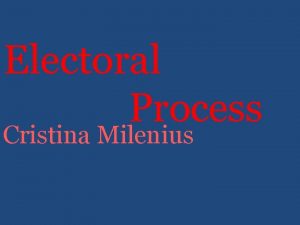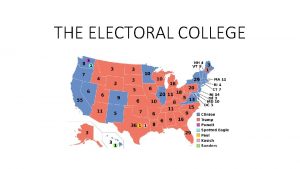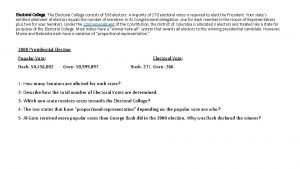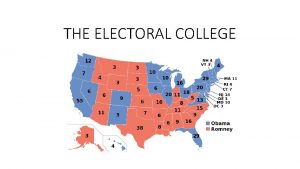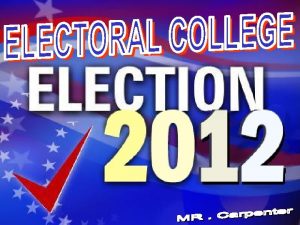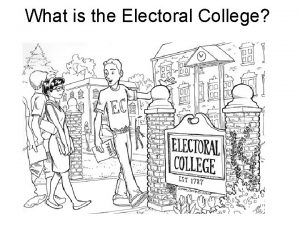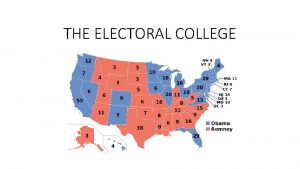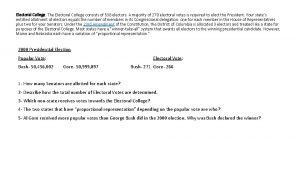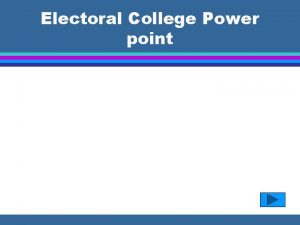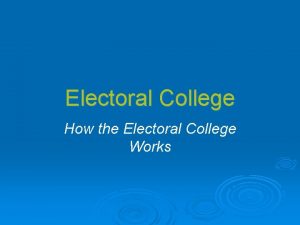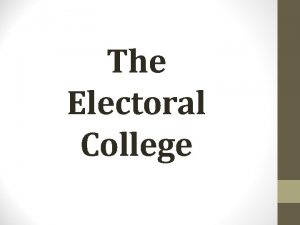The Electoral College Process Electoral College Why an




















- Slides: 20

The Electoral College Process

Electoral College

Why an Electoral College? • The Founding Fathers felt an EC was necessary for a few reasons: • First, they questioned whether the electorate was capable of selecting an adequate leader for the nation if the people chose the “wrong” President, the EC could override the vote.

Why an Electoral College? • Second, voters had very little knowledge of candidates outside of their local area or state voting was based primarily on REGION

Step 1: Popular Vote • On election day, voters choose who they want to be President & Vice President • What we’re actually choosing are ELECTORS who represent the political party of the candidate we like • These electors are then supposed to vote for the candidate that wins the popular vote in a given state

Step 2: “Winner Take All” • The EC system is “winner take all. ” • That is, the candidate with the most popular votes gets ALL of the electoral votes (except in Maine and Nebraska where the electoral votes can be divided)

Step 3: Counting the Votes • The electors then meet in the State capitol to cast votes for the candidate they represent (Monday after the 2 nd Wednesday in December). • Those votes are then sent to the president of the Senate in DC • The president of the Senate counts the votes on January 6 (this is done before Congress)

Step 3 a: What if There Is A Tie (or if no one wins)? • If no Presidential candidate gets 270 electoral votes, the US House of Representatives takes a vote to determine the winner (this happened in 1800 & 1824) • If no Vice Presidential candidates receives enough votes to win, the Senate takes a vote to decide who the winner is (this happened in 1837). http: //www. senate. gov/artandhist ory/history/minute/The_Senate_E lects_A_Vice_President. htm Richard M Johnson

Flaws of the Electoral College

#1: It’s possible to win the popular vote but lose the electoral vote • 1824 Andrew Jackson (41. 3% of the popular votes, John Quincy Adams 30. 9% of the popular vote) – Jackson received 99 of 261 electoral votes more than any other candidate but not enough to win


1876 • Samuel J. Tilden – 4, 288, 546 popular votes – 184 electoral votes • Rutherford B Hayes – 4, 034, 311 popular votes – 185 electoral votes


1888 • Grover Cleveland – 5, 534, 488 popular votes – 168 electoral votes • Benjamin Harrison – 5, 443, 892 popular votes – 233 electoral votes


2000 • Al Gore – 50, 992, 335 popular votes – 266 electoral votes • George W Bush – 50, 455, 156 (537, 179 votes less) – 271 electoral votes • Florida was decided by only 537 votes!



#2: Electors Don’t Have to Do What We Tell Them To • Electors have refused to vote for their party’s nominee – – – 1796 1820 1948 1956 1960 1968 1972 1976 1988 2000 2004 an elector from MN voted for John Edwards (twice, Pres & VP)

#3: The contest could be decided by the House • Problem: The voting is not done by members of the House but by state. • Why is that a problem? • A state could lose its votes if no candidate received a majority • If a 3 rd party candidate were involved, the vote could be divided and no one would be declared winner by January 20
 Why why why why
Why why why why Electoral college changes
Electoral college changes Compromise
Compromise Chapter 7 the electoral process
Chapter 7 the electoral process Dont ask why why why
Dont ask why why why The 1964 electoral map above illustrates the
The 1964 electoral map above illustrates the Election machine
Election machine Geografía electoral
Geografía electoral Largest borough
Largest borough Geografía electoral
Geografía electoral Materia electoral
Materia electoral 1992 electoral map
1992 electoral map Ejemplo cuociente electoral junta directiva
Ejemplo cuociente electoral junta directiva Northern territory electoral commission
Northern territory electoral commission Tipos de incidentes en materia electoral
Tipos de incidentes en materia electoral 1932 electoral map
1932 electoral map Bodega electoral
Bodega electoral Flujograma de documentos electorales
Flujograma de documentos electorales Gabriel mendoza elvira
Gabriel mendoza elvira Electoral connection definition
Electoral connection definition Cuerpo electoral significado
Cuerpo electoral significado



